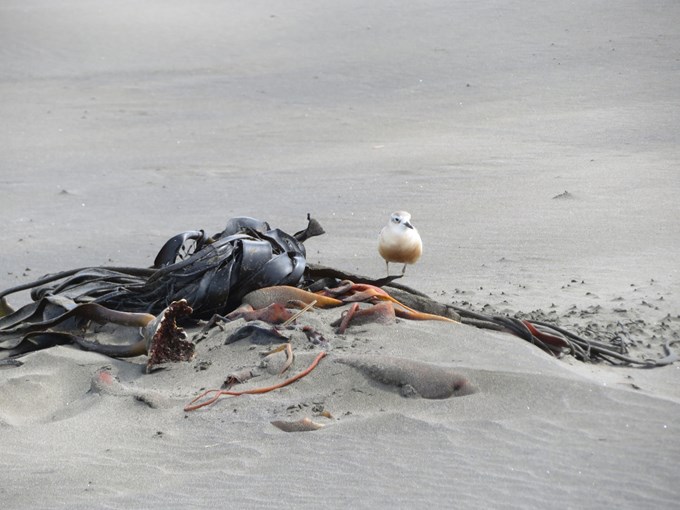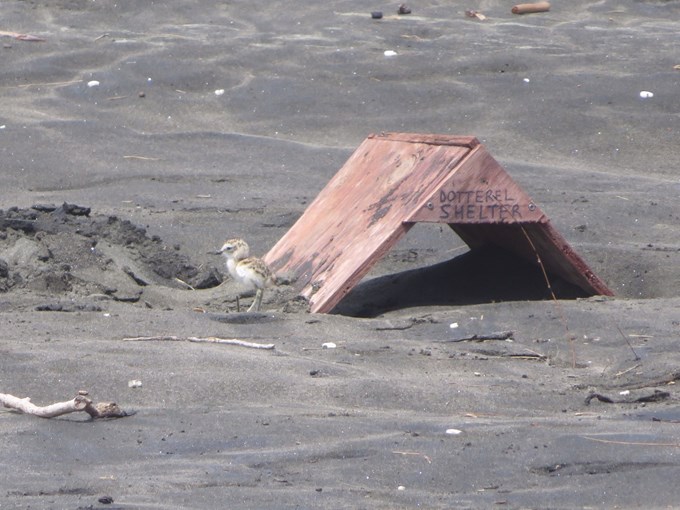They have an uncanny ability to camouflage themselves from some predators, but this skill is also their greatest danger.
Once one of the country’s rarest birds, only 2500 New Zealand dotterels remain. The plucky northern New Zealand dotterel has seen a turnaround in fortune as numbers increase steadily in the region. Last summer 108 chicks fledged, the most since 2008 when monitoring began. This has helped to improve the bird’s conservation status from 'declining' to 'recovering'.
While the dotterel is now no longer considered a threatened species, that could all change in the blink of an eye if their breeding grounds are not protected.

“It’s a huge relief to see the improved conservation status for tūturiwhatu pukunui, or NZ Dotterel” says the Chair of the Environment and Climate Change Committee, Councillor Richard Hills.
“Tūturiwhatu pukunui used to be a widespread species but were reduced to near-extinction by introduced predators, coastal development and breeding disturbance.”
“Sadly, human activity is still one of the biggest threats to these birds, and the disappointing acts of a few individuals can turn back the years of hard work and dedication from our staff, Mana Whenua, and countless volunteers.”
Dotterels are still extremely vulnerable to human disturbance, predation, and other natural events particularly during the breeding season from September to March.
“It’s unfortunate the breeding season coincides with summer when Aucklanders flock to the beaches. So, it’s important for us to give the dotterels space so they can successfully raise their young,” says Tim Lovegrove, Auckland Council’s Senior Regional Advisor (Fauna).
“What’s been happening for example at Omaha Beach, is not what we want to see. Beachgoers ignoring signs, setting up for the day inside the predator-fenced bird sanctuary with their barbecues and deck chairs and even playing cricket.
“These activities mean nests can be damaged and eggs and chicks crushed, while dotterel parents waste energy on distraction behaviour, exposing any surviving chicks to predation by harrier hawks or black-billed gulls. The beach is the birds’ home and that’s where they breed, so we need to be aware,” he adds.

A network of dotterel minders has been key to conserving dotterels in the Auckland region. Gwenda Pulham has been watching out for them north of the harbour bridge since 1976. She’s spent hundreds of hours on the region’s roads and beaches helping protect the birds.
“The human impact on these birds is relentless. However, what makes protecting them rewarding is seeing them survive and breed successfully.”
At Te Henga, volunteer dotterel minders have spent hours setting predator traps near the birds’ nests, which are hidden in the dunes. While they’ve observed up to 60 eggs being laid on their beach in the last decade, only one has survived.
Lesley Gardner who co-ordinates the local group says, “Dotterels are rarer than kiwi; we’d love to see more of them survive here but human behaviour and predators are making it very difficult. If we help them out and act as kaitiaki, hopefully their numbers will grow.”
“I’d like to thank everybody who has been involved in the far-reaching conservation effort to give these little birds a fighting chance. While we still have a way to go to ensure that tūturiwhatu pukunui are protected for years to come, the population increase that we are seeing is a really promising start,” adds Councillor Hills.
Here’s some advice when visiting a beach this summer where dotterels live:
- watch your step when crossing dry sand where dotterels are more likely to nest
- walk on the wet sand
- give the dotterel families space
- if you see a dotterel doing a broken wing display, move away
- if you are taking a dog, check the local dog access rules for the beach
- it is an offence under the Dog control /Act to allow your dog to harass wildlife.
And if you see members of the public disturbing wildlife and not behaving in a thoughtfully around these birds, it can be reported by calling 09 301 01 01.
Beaches to be vigilant on when walking:
- Omaha Beach
- Pakiri Beach
- Piha
- Scandretts Bay
- Shakespear Regional Park
- Snells Beach
- Tawharanui Regional Park
- Tara Iti golf course
- Te Muri Regional Park
- Wenderholm Regional Park
- Whakanewha Regional Park
- Bethells Beach



